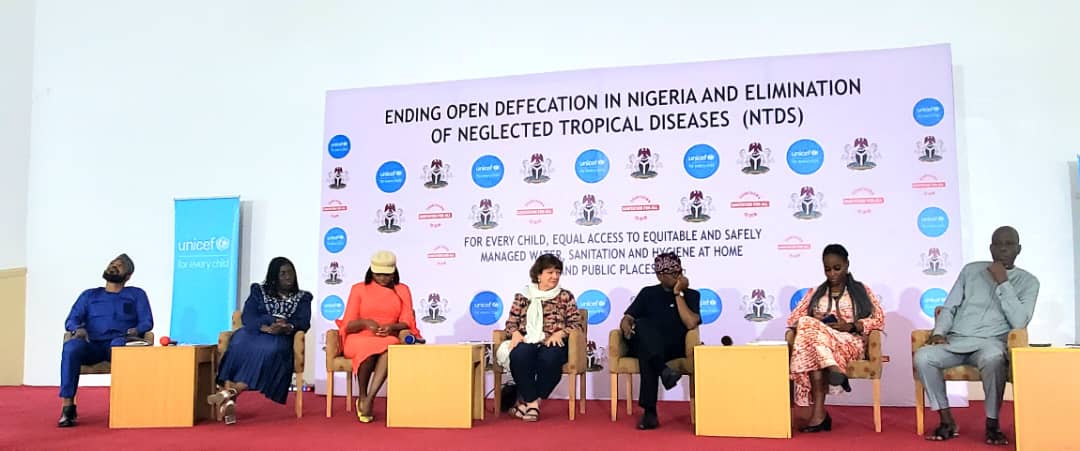
Open defecation remains a significant public health threat in Nigeria, fostering the spread of diseases such as cholera, typhoid, and neglected tropical diseases (NTDs).
Nigeria remains one of the countries with high rates of open defecation, with approximately 25% of its population still practising it.
However, despite global efforts to curb this practice, many communities still lack proper sanitation facilities, leading to serious health consequences in many Nigerian states.
A media dialogue organized by UNICEF in collaboration with Oyo State’s RUWASSA allowed stakeholders, including experts from the water and sanitation sector, to discuss strategies for ending open defecation and eliminating NTDs in Nigeria.
During the event held on September 11 in Lagos, leaders from diverse sectors shared their insights and proposed solutions to improve sanitation both at home and in public spaces. Dapo Otunla, Senior Vice President at IHS, and Joseph Adeyemo from the Federal Ministry of Water Resources were among those who emphasized the need for public-private collaboration to achieve national sanitation goals. “Government cannot do it alone and we have to be consistent with workable indicators,” said Oyetola Oduyemi, Senior Director at The End Fund, highlighting the importance of integrating the private sector into efforts to combat open defecation.
Others like Dare Olatunji from Water Aid Nigeria, suggesting working models that other states can borrow a leaf to address the teething problem of ODF.
On the other hand, the Chief of Water, Sanitation, and Hygiene (WASH) for UNICEF Nigeria, Jane Bevan, expressed her concern about the lack of public toilets in many localities. She urged the media to play a positive role by promoting awareness of available sanitation facilities. “The media can help by publicizing working public toilets and sensitizing the public on their use,” Bevan explained, pointing out the vital role that proper sensitization can play, especially in urban and rural settings.
The media dialogue also featured Nigerian singer and UNICEF Champion Waje, who urged her peers in the entertainment industry to use their platforms to raise awareness about sanitation and hygiene. She held that influential figures can make a significant impact by advocating for improved sanitation practices across Nigeria, especially in rural communities where the issue is most pronounced.
At the core of the dialogue was the consensus that achieving open defecation-free status by 2025 is possible if concerted efforts are made. Panellists underscored the need for sustained community engagement, infrastructure development, and continuous advocacy to ensure access to safe and hygienic sanitation facilities for all Nigerians. They argued that an investment in sanitation is an investment in public health, economic stability, and overall national development.
With new policy guidelines and stronger collaboration between the government, private sector, and civil society, Nigeria is poised to tackle the challenges of open defecation and NTDs.
Apparently, the dialogue set the tone for renewed commitments and actionable strategies that can make a significant difference in improving sanitation and health outcomes nationwide in the next five years.

Suggestions to Tackle Open Defecation and NTDs:
Tackling the aforementioned issues requires a combination of improved sanitation infrastructure, community-led initiatives, robust public health campaigns, and stronger policy enforcement. Public-private partnerships can also help ensure better access to clean water, functional toilets, and sustained hygiene education. Regardless, here are some suggestions that proved timely:
1. Expanding Access to Sanitation Facilities: There is an urgent need to build more public toilets, especially in rural and urban slums, and ensure their proper maintenance.
2. Community-Led Total Sanitation (CLTS): Engaging local communities in behavioural change initiatives to promote toilet usage should be considered viable.
3. Policy Implementation: There should be strict enforcement of sanitation laws and provide incentives for households that build proper toilets.
4. Collaboration Between Sectors: Government, private sector, and non-profits should collaborate on water and sanitation projects where necessary and sustainably.
5. Public Awareness Campaigns: Policy makers should leverage media and influencers to increase awareness about the dangers of open defecation and the importance of hygiene.
6. Integration of NTD Treatment Programs: It is contingent on the government to combine sanitation efforts with healthcare services to treat and prevent NTDs in affected areas.
